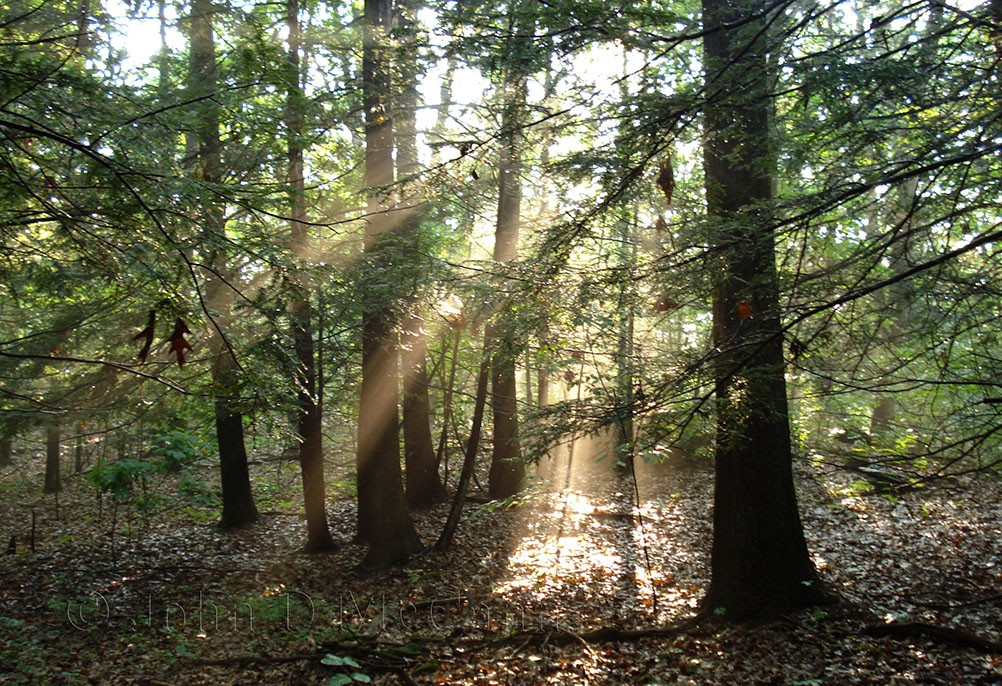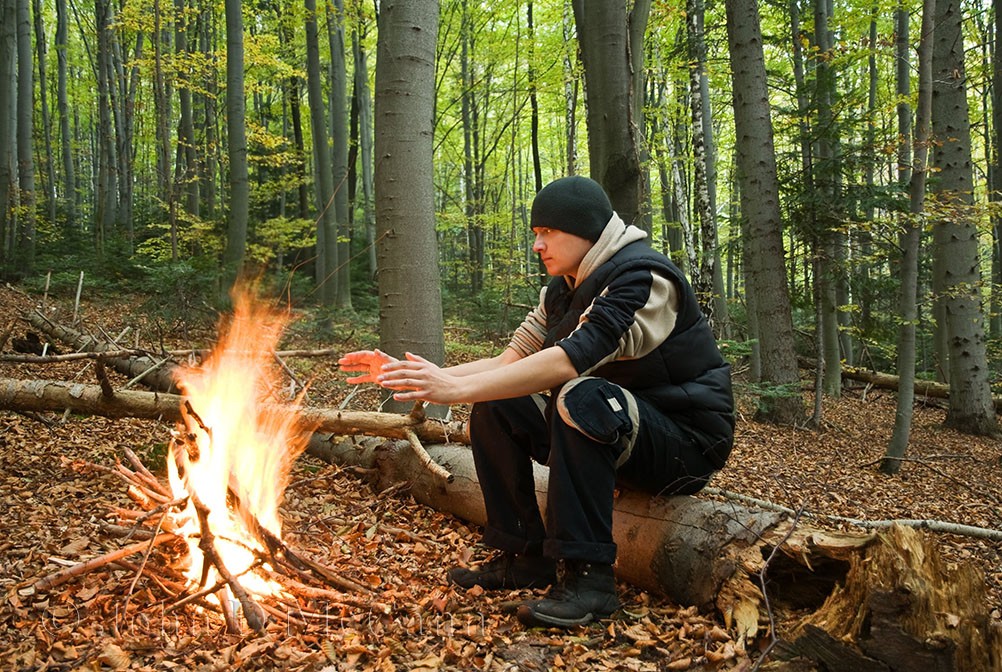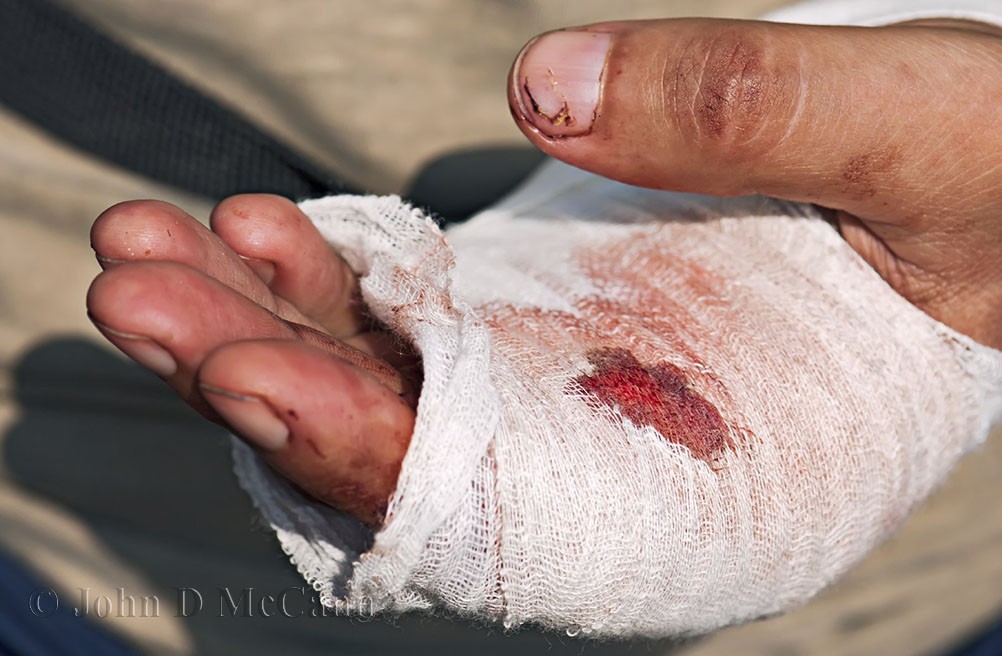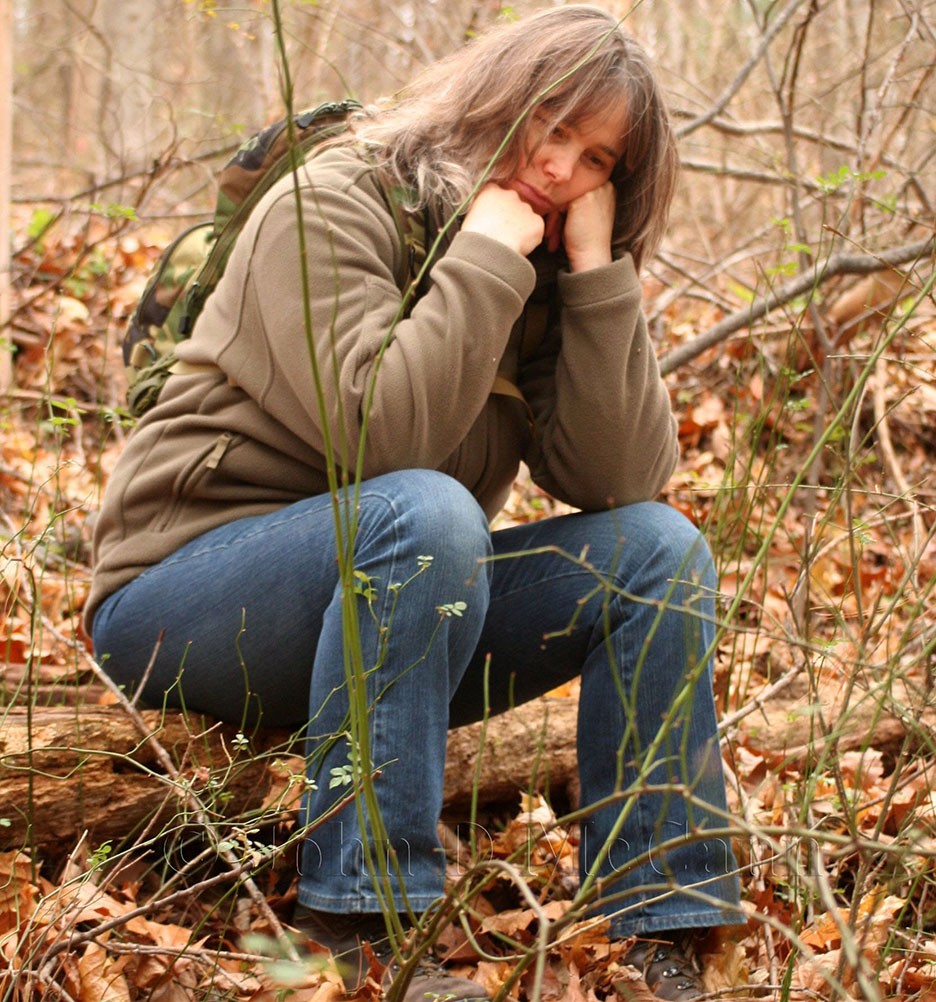- New Products
- Exclusive Gear
- Bushcraft Gear
- Containers
- Cooking
- Fire
- First Aid
- Food Gathering
- Knives & Tools
- Knife Collectors Corner
- Light
- Logo Gear
- Misc. Items
- Navigation
- Packs, Pouches & Bags
- Personal Care
- Repair Gear
- Shelter & Protection
- Signaling
- Urban Survival
- Water
- Writing Gear
- John's Books
- Bargain Bin
The Survival Mentality
It has become a survival axiom that your most important survival tool is your mind. I agree of course, but that mind must be working properly in order to be an asset. Unfortunately, the onset of a survival situation throws the mind out of equilibrium. In other words, the mind is thrown out of balance. The mind controls the body and the body automatically reacts. The psychological situation often triggers a physiological reaction. It is like the feeling you might get in your stomach when you hear a pilot announce "Brace For Impact". Not a good feeling, but one you can't control.
It is important to understand what causes these feelings so that they can be dealt with in a reasonable manner. Panic is not an asset for those who want to survive, so in order to prevent panic, we must understand fear.
FEAR FACTORS
Man has many fears, but many of them, including some you might not even be aware of, rear their ugly head at the onset of a survival situation. An understanding of the fears associated with a survival situation might allow you to control them when, all of a sudden, you are lost, stranded or otherwise thrust into unexpected situation.
EMBARASSMENT
This may be hard to believe, but research shows that this is often the first fear that occurs. This is especially true for those who think of themselves as experienced outdoors people, such as hunters, through hikers, adventurers, campers, etc. They, in their mind, have a reputation to maintain, and are fearful of being ridiculed for having allowed themselves to get into the situation they are in. The embarrassment of their situation becomes an actual fear.
THE UNKNOWN
Being afraid of the unknown is normal. The mind starts asking the questions. What will happen to me? Will I ever be found? What will happen if I can't get out of here? Will I ever see my family again? What is that noise? Where am I? These are all questions people ask themselves, and dwelling on them only intensifies the fear.
 The unknown can trigger fear when stranded in the wilderness.
The unknown can trigger fear when stranded in the wilderness.
DEATH
A survival situation seems to make people face the possibility of death and it can be a strong feeling. This type of thinking can paralyze a person from acting in a rational manner, which of course, thwarts any efforts in dealing with the matter at hand.
DISCOMFORT
This is a very normal fear for many people, especially those who are not very experienced with being out in the wilderness. They are afraid of being on the ground, in the dirt, drinking dirty water, being bitten by bugs, getting muddy, etc. Although only minor discomforts for some, they become extreme fears for other. I once had a student at our survival school who was asked to crawl into a survival shelter that had been built by the class. When he refused, I asked if he was claustrophobic, and he said "No... I'm gross-a-phobic. Finally, after the class kidded him about it, he got in and as soon as the photo was taken he came out like a hornet. We assumed the fear of embarrassment overpowered his fear of discomfort.
BEING ALONE
Even many outdoorsmen have never really been alone. Some never even realize it until it happens. All of a sudden they are alone... really alone for the first time in their life and it is frightening. Again, the fear can capture the imagination and trigger other fears. In the movie Cast Away, Tom Hanks, stranded on an island, became so desperate for a friend that he drew a face on a volleyball and called it "Wilson". After four years, while trying to sail back to civilization on a raft he constructed, Wilson falls from the raft and Chuck (the part being played by Tom Hanks) can't retrieve him. Who can forget the sadness that overcame Chuck, as he screamed "WILSON". To Chuck, the friend was real and kept him from being alone.
 Many people have never really been alone in the wilderness which can trigger fear.
Many people have never really been alone in the wilderness which can trigger fear.
DARKNESS
Many people have a fear of the dark even when they are not in a survival situation. But couple this fear with being in an unknown wilderness location, where sometimes turning on a light is not an option, and the fear can become overpowering.
ANIMALS
The fear of wild animals is real for a lot of people. People who are not used to being in the outdoors often have never seen, nor heard the sounds, of a wild animal. The first time can be frightening for some. I once had a student, an executive from NY City, at a basic course who had never heard coyotes at night. The second night of the course, the coyotes were not only very active in regard to their howling, but several seemed to get into an altercation, as it became quite loud and ugly sounding. The next morning I asked the student how they had slept. He stated he had been woken by the sounds of the coyotes, and it sounded like they were so close that he thought they might attack and so he got out of his tent and hid behind it. This seemed very irrational to me, and when I asked what that would solve - putting himself outside of the tent instead of inside - he said, "I don't know, I was just so scared I didn't know what to do." It just shows what fear can do to an otherwise intelligent person.
 The fear of wild animals is real for many people.
The fear of wild animals is real for many people.
IGNORANCE
This fear occurs most often to people who have little training in survival. When the situation occurs they know they are in trouble and fear that they won't know how to help themselves. Even though many do survive, the onset of the fear can keep you from doing something... anything, to help your current situation. Many people will realize that they have more ability than they think, and get to the business of surviving.
PUNISHMENT
This fear more often occurs with children and the elderly. They are afraid that they will be punished for whatever led to their situation. Being lost, wandering away, not being where they were supposed to be, etc. This is why children will often hide when they are lost. The fear of punishment for their actions, although irrational, is real in their mind.
HOW TO CONTROL YOUR FEARS
As we established earlier, in order to prevent panic, we must understand fear. We now know what some of the fears are that affect people in a survival situation. But that is not enough. Mark Twain once said, "Courage is resistance to fear, mastery of fear, not absence of fear". We must learn how we can control those fears, so panic, does not have a chance to control us.
When fear strikes, we know we must act immediately. Don't run from it, but recognize and admit it. In order to prevent the physiological symptoms listed, there are three things you can do:
1. People tend to hold their breath when frightened, so Breath, Breath, Breath! Breathing prevents hyperventilation which affects respiration. Try to establish a regular breathing pattern, which will help you relax.
2. People also have a tendency to freeze when frightened. The breathing helps you to relax, which helps prevent you from becoming tense. Tense muscles can add to anxiety by reinforcing fear.
3. Lastly, Move! When people freeze in the middle of a threatening situation it results in inaction. To break this natural instinct, move. By doing something, you will lessen the dread of the fear and help you restore confidence in yourself. Staying busy also keeps your mind busy, and away from the negative aspects of the situation, reinforcing the fear.
4. Another way you can limit fear is by being prepared to survive! I have always been an advocate of carrying the basic essentials for survival with me whenever I leave the safety of my immediate surroundings, or what I call, the "safety zone." I always wear, or have with me, proper clothing for a change of weather. How many times I have been hiking and it starts to rain. While continuing on my way wearing my available rain gear, I pass others in a soaked t-shirt and jeans. I have seen these same unprepared type hikers on a hot sunny day on a trail without any signs of having water on them.
Preparedness also includes knowledge and training in regard to handling a survival situation. I have "beat a dead horse to death" over the years advocating the practicing with your survival kit and learning the skills of survival. Being properly equipped is not nearly as important as knowing how to use the equipment. In John Leach's book, "Survival Psychology," he states "Familiarity with the use and handling of survival equipment is also essential during training... Unfamiliarity with equipment stops people from using it. Victims have been recovered from life rafts with a survival box (containing flares, rations, first-aid kit and so on) unopened and the necessary contents unused." Carry the essentials to survive and be comfortable with their use.
Lastly, keep physically fit. The combination of being prepared, being knowledgeable, and fit for survival, develops confidence in yourself and your ability to face your fears in a survival situation. The key is preparation!
ADDITIONAL SURVIVAL STRESSES
We have already established that the major stress of a survival situation is fear. But there are others, and we should address them. These other stresses can, and will, affect your emotional capabilities so being aware of them will help you better identify, and subsequently deal with them.
PAIN
Oftentimes an injury is involved with, or related to, a survival situation. An injury can result in the stress of dealing with pain. Although pain is a hard thing to ignore or get away from, it can be managed or tolerated, and must. When possible, don't allow pain to keep you from performing necessary activities to survive, unless this will cause further injury. Oftentimes, the effort expended performing survival tasks can minimize or reduce your thoughts about the pain. You must still survive, and this takes action. In the Marine Corps, they used to say, "Pain Is Just Fear Leaving the Body." It may sound stupid, but it allows your mind to accept the feeling of pain, deal with it, and continue with your mission. So try to deal with pain as much as possible and concentrate on the business of survival. Most people have much more tolerance and reserves than they realize.
 Pain can be an additional stress in a survival situation.
Pain can be an additional stress in a survival situation.
COLD & HEAT
Both cold and heat can stress the body, and quickly. Although Hypothermia and Hyperthermia are real issues, let's touch on the stresses these two killers can provoke.
Cold can lower your ability to perform, and thus your efficiency in a survival situation. Your body becomes numb because the cold lowers the blood flow to the extremities. It can numb not only your body, but your mind as well. When Extreme cold numbs the mind, all you can think about is getting warm again. This "Numbness", of both mind and body, is a serious and major stress, and must be dealt with immediately.
As "numbness" is the major stress of being cold, "weakness" is the major stress of being hot. The stress of heat increases dehydration. When you become dehydrated, you begin to feel weak and fatigued. Your blood volume decreases when your body lacks the required amount of water. This in turn leads to less nutrients and oxygen being delivered to the cells, thereby leading to weakness and fatigue.
 Both Cold and Heat can cause stress to the body, and quickly.
Both Cold and Heat can cause stress to the body, and quickly.
THIRST & DEHYDRATION
One of the most critical problems facing a survivor is the lack of water and the accompanying problems of thirst and dehydration. Like fear and pain, thirst can be tolerated if you have determination, remain calm and purposeful. However, in order to avoid dehydration, you must drink water. When the body's water balance is not maintained, thirst and discomfort result. As previously stated, dehydration decreases the body's efficiency or ability to function, and can also cause irrational behavior. In order to mitigate this stress, try to stay hydrated to avoid thirst and dehydration.
HUNGER
Although many people believe that starvation is a major hazard of a survival situation, it is far from the truth. How many times have you heard a hungry person, probably because they missed lunch, state they were starving? Most people have enough extra pounds on them to get them through plenty of days with no food. But the mind can see it differently, so the stress of hunger can be real, although not life threatening. Because of this, hunger is one of the easier stresses to deal with, if you keep a positive mental attitude.
DEPRESSION
Depression, often caused by boredom and loneliness, can be another major stress for a survivor victim. A survival situation can produce long periods of sadness or other negative feelings and these can lead to depression. Just being alone and waiting for rescue can allow depression to creep up on you. Depression can be a difficult problem because it can affect a wide range of psychological responses. An example would be fatigue leading to a feeling of depression. Depression might increase the feeling of fatigue, which could lead to deeper depression.
The best way to deal with depression is by staying busy, adapt to your situation, and maintain a positive mental attitude.
 Depression can be another major stress for a survivor victim.
Depression can be another major stress for a survivor victim.
FATIGUE
As a result of a survival situation, your body is under the constant strain of diminished energy levels. You get less sleep and food which can lead to fatigue. As in the case of other stresses, even moderate fatigue can reduce efficiency, and make your more susceptible to hypothermia, poor judgment, and injuries. You must be constantly aware of the dangers of overexertion. As a result of other stresses, you may already be experiencing strain and reduced efficiency. Even though considerable exertion might be required in a survival situation you must avoid complete exhaustion. Rest is a basic factor for the body to recover from fatigue. Short rest breaks during extended stress periods can improve the overall output of energy. Fatigue can be reduced by working smarter. Adjust your pace and remember that economy of effort is most important.
THE WILL TO SURVIVE
The will to survive has been defined as the desire to live despite seemingly insurmountable mental and/or physical obstacles. Even though you might have the tools (a survival kit) and the training, it might not be enough in a survival situation. You must have the "Will To Survive."
The human mind has the amazing ability to overcome stress and hardship even when there appears to be little chance of surviving. This is often when the "will" comes into play. That mental attitude can bridge the gap between realizing the severity of your situation and understanding it is not going away, and resolving to endure the situation without quitting, no matter what,
Without going into the mistakes he made that put him in the situation, let's examine the story of Aron Ralston who amputated his own arm with a pocketknife. Ralston, a 27 year old Aspen mountaineer was trapped when a boulder weighing 800-1,000 pounds pinned his arm for five days in a remote desert canyon in eastern Utah. With no water and little hope of survival, Ralston cut through his own arm below the elbow, applying a tourniquet and administering first aid, before rigging anchors and fixing a rope to rappel to the bottom of a canyon to meet his rescuers. Ralston told rescuers that he realized he would not survive unless he took drastic action, as he had run out of water days before.
Another incident involves a Colorado fisherman, Bill Jeracki, who cut off his leg at the knee when two boulders fell on his leg while angling alone in a remote canyon stream. Trapped and yelling for hours, he finally made the decision to sever the limb after the weather took a turn for the worse and he became concerned for his survival. He used hemostats from his fishing kit to close the severed artery and vein, then crawled a half mile back to his truck and drove to find help.
What can explain the actions of these men? The Will To Survive! The will to survive is not automatic, and can be swept away by panic and fear if you let it, but the will to live can be the key factor in either surviving or becoming a victim.
Another key asset is optimism. You must maintain a positive, optimistic outlook on your circumstances. If necessary, hope and faith can help. Both prayer and meditation can help, but how a survivor maintains optimism is not as important as having it.
MINIMIZING PANIC
One of the essentials in a survival situation is to minimize panic. You must remain calm and think. Do whatever it takes to persuade yourself to avoid panic and stay calm. This is the essence for accepting your situation and preparing for making the best of it.
An often used acronym in the survival community is S.T.O.P., and in my opinion, is worth reiterating here. This acronym helps you to remember the steps to take when you are involved with an emergency situation. The steps are as follows:
 The acronym "STOP" can help you remember the steps to take in an emergency situation.
The acronym "STOP" can help you remember the steps to take in an emergency situation.
SIT
You can prevent running around like a chicken with its head chopped off if you just sit down. Take a deep breath and use this time to initiate the thinking process and minimize your urge to run. If available, take a drink of water and organize your thoughts.
THINK
Think about immediate problems or dangers, and not those that are unreal. If the weather looks bad, you need shelter. Asses your choices and determine what you have with you to help your situation. Where is your survival Kit? How can I use it to make my situation better? Knowing your prepared by being equipped and having the required skills can give you confidence and reduce your fears and stresses. Confidence reduces your chances of doing something stupid.
OBSERVE
Observe your surroundings and be aware of any dangers. Also determine what resources might be available. Look for basics like water, a safe place for a shelter or campsite, a place to signal for help from. What are the current conditions in regard to available daylight left, is the temperature dropping, etc.?
PLAN
Now that you and your mind are organized, and you are thinking in a rational manner, start to develop a plan. Determine your best course of action with available resources and time. Then make some immediate decisions and get going. If you are going to stay, which is often the best choice for at least the first night, select a campsite and shelter location. Start constructing a shelter, gather water, resources to start a fire, any food you might find, set up any signaling if available, and try to maintain a good spirit. Stay busy on positive efforts.
During your survival ordeal, it is important to maintain your physical as well as mental wellbeing. Take care of yourself and your equipment. Try to keep your clothing in as good a shape as possible as it is your first line of defense in shelter. Don't be one of these people who show up on the news with clothing torn or missing, cut, bruised, and out of their mind. Remember your skills and have faith. Only the strong survive!
We hope you enjoyed this article and will help support our efforts by checking out our products. As always, Be Prepared To Survive!
Copyright © 2016 by John D. McCann
It should be noted that this information first appeared in my book "Stay Alive! Survival Skills You Need" and has been updated with new photographs.


